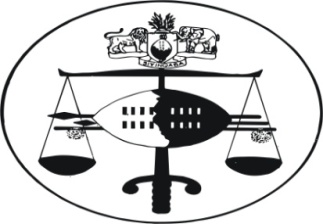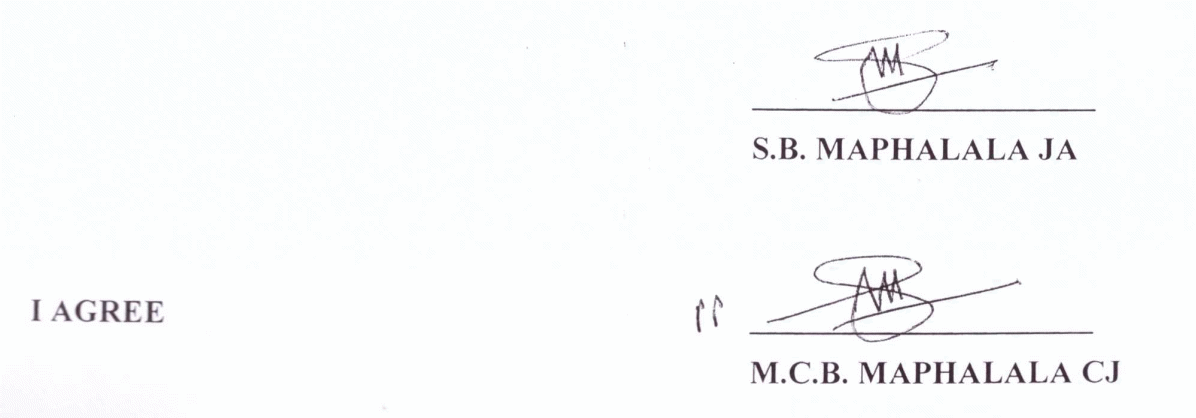
IN THE SUPREME COURT OF SWAZILAND
JUDGMENT
Civil Appeal Case No. 29/16
In the matter between:
STANLEY MCHEPA BANDA 1st Appellant
ROSALIND KATONGO BANDA 2nd Appellant
And
SWAZILAND DEVELOPMENT AND SAVINGS
BANK 1st Respondent
SILENCE GAMEDZE N.O. 2nd Respondent
Neutral citation: Stanley Mchepa Banda and Another vs Swaziland Development and Savings Bank and Another (29/2016) [2017] SZSC 56 (10 November, 2017).
Coram: M.C.B. MAPHALALA CJ
S.B. MAPHALALA JA
J.P. ANNANDALE JA
Heard: 14 August, 2017
Delivered: 10 November, 2017
Summary: Civil Procedure – issue for decision – whether 1st Respondent was entitled to abandon the judgment and proceed to default judgment on the previous action or whether it was obliged to institute a new action on alleged compromise –Court finds there is no merit in the Appeal.
JUDGMENT
S.B. MAPHALALA JA
Introduction
[1] This is an appeal against the judgment of the High Court where that Court dismissed an Urgent Application for rescission of a judgment granted in default in favour of the 1st Respondent thereto.
[2] The Appellants in this appeal were cited as the 2nd and 3rd Defendants in Case No. 1761/11 in the High Court. Various cases had been consolidated under this case number in which the 1st Respondent in this appeal sought payment of an amount of E3,335,620.39, interest and a declaration that two bonded properties be declared executable. The 1st Respondent claimed against the Defendants jointly and severally.
The Appeal
[3] The judgment appealed against refers to an Application for rescission dated 14 October, 2013. The Notice of appeal before this court was filed on the 1st April, 2016 seeking orders in the following terms:
1. The learned Judge a quo erred by holding that the 1st Respondent was entitled to revert to the original claim after the parties had concluded a compromise. In casu, the 1st Respondent had not reserved to itself the right to revert to the original suit, it was therefore precluded from doing so.
2. The learned Judge erred further by finding that Rule 41 (2) was rightly applicable. The 1st Respondent could not unilaterally abandon a consent Order. As such, an Order rendered the matter res judicata. 1st Respondent became barred from reviving the legal suit and applying for default judgment as the legal suit had been compromised.
3. The learned Judge erred by holding that 1st and 2nd Appellants remained parties to the suit notwithstanding the conclusion of the settlement agreement particularly clause 8.1. Further parties to a settlement agreement could not be found elsewhere e.g answering affidavit alluded to by the Learned Judge.
4. The learned Judge erred by directing that each of the Applicants pays the costs.
The parties
[4] Parties in this appeal and their relations are as follows; a company by the name of Starros Import and Export (Property) Limited (Starros procured a bank facility for the 1st Respondent and the Appellant and bound themselves as sureties for such a loan).
[5] Pursuant to default of settling the loan and honouring the acknowledgement of debt (in agreement) by the principal debtor, a default judgment and writ of execution was issued in favour of the 1st Respondent and the 2nd Respondent as Deputy Sheriff of the court a quo was to execute the writ.
The background
[6] The facts of the matter are captured in paragraphs 1 to 5 of the 1st Respondent’s Heads of Arguments to be the following:
1. The Appellants in this appeal were cited as the second and third defendants in case number 1761/11 in the High Court. Various cases had been consolidated under that case number in which the 1st Respondent in this appeal sought payment of an amount of E3,335.020.39, interest and a declaration that two bonded properties be declared executable. The 1st Respondent claimed against the Defendants jointly and severally.
2. The cause of action against the Appellants herein, being the 2nd and 3rd Defendants in the action, is founded on a surety mortgage bond in terms of which they were the mortgagors and bound themselves as sureties and co-principal debtors to the 1st Defendant in case number 1761/11. In addition the 1st Appellant executed a personal suretyship in favour of the 1st Defendant in an amount of E4,500,000.00.
3. No notice to defend was filed by the Defendants under case number 1761/11. On 14 July 2011 the 1st Defendant in the case, “Starros” signed an Acknowledgment of Debt in terms of which it agreed to pay arrears by 1 august 2011. In terms of clause 8.1 the document represented the whole agreement between the parties (being Starros and the 1st Respondent) for purposes of settling the proceedings under case numbers 1761/11, 1762/11 and 1662/11. Clause provided that the agreement would be made an order of court. The agreement was made an order of court on 15 July 2011.
4. Starros did not make payment in terms of the agreement in which it had secured an extension of time within which to pay the arrears. The 1st Respondent therefore abandoned the order of 15 July 2011 by giving due notice thereof in terms of the High Court Rules and thereafter applied for and was granted default judgment in December 2011.
5. Starros, being the 1st Defendant in the action, and the Appellants herein applied for rescission of the default judgment which application was dismissed in a judgment dated 14 March 2016. The Appellants appeal against that judgment. It is significant that the principal debtor, Starros, has not filed an appeal against the judgment.
[7] The crisp issue in this appeal essentially amount to whether the 1st Respondent was entitled to abandon the judgment and proceed to default judgment on the previous action or whether it was obliged to institute a new action founded upon the alleged compromise.
The arguments
[8] The attorney of Appellants and the Respondents have filed comprehensive Heads of Arguments together with bundles of authorities in support thereto.
[9] Firstly, the Appellants contend in ground 1 of the Notice of Appeal that the court a quo erred in holding that the 1st Respondent was entitled to revert to the original claim after the conclusion of the alleged compromise. That it is averred in this ground that the 1st Respondent had not reserved the right to revert to the original suit and was precluded from doing so (see page 146 of the Record).
[10] Secondly, the Appellants allege in ground 3 that the court a quo erred by holding that the Appellants remained parties to the suit notwithstanding the conclusion of the settlement agreement and particularly clause 8.1 thereof
[11] On the other had, it is contended for the 1st Respondent at paragraph 10.2 of the Heads of Arguments of Advocate P. Flynn that the Appellants were not party to the compromise and could only be relieved of their obligation as sureties and co-principal debtors in the event that Starros complied with the condition in the acknowledgment to pay within the stipulated time frame. In continuing with the action the 1st Respondent was within its rights to obtain judgment against all the Defendants therein. In this regard the attorney of the 1st Respondent relied heavily in the dictum in the South African case of Nagar vs Nagar 1982(2) SA 263 (Z).
The Court’s analysis and conclusions
[12] It would appear to me that the 1st Respondent is correct that the first port of call is an analysis of the Acknowledgment of the Debt to determine the remedy open to the 1st Respondent in the event of a breach.
[13] First the preamble at page 99 of the Record indicates that Starros needed an extension of time to the end of July, 2011and this was clearly to make payment of the arrears.
[14] Starros acknowledged that it was indebted to the 1st Respondent in the amount set out in the three cases and agreed to a consolidation as reflected at paragraphs 3 and 4 of the Record.
[15] Starros undertook to pay the arrears by 1st August, 2011 and thereafter to make arrangements for payment of the balance.
[16] The Respondent is correct to point out that the acknowledgment merely provides for a time frame, being an extension of time for the payment of arrears, and in the event that the extension is complied with the action is settled. That if payment is not made in time alleged it must follow that action not settled.
[17] The Respondent is further correct in its contention that a condition for settlement is clearly implied in the acknowledgment. The condition for settlement is that payment would be made by 1st August, 2011. If payment was not received in the time as agreed the action is not settled and therefore, the 1st Respondent was entitled to proceed with the action based on the alleged compromise.
[18] The Appellants were not party to the compromise and could only be relieved of their obligation as sureties and co-principal debtors in the event that Starros complied with the condition in the acknowledgment to pay within the stipulated time frame. Therefore, in continuing with the action the 1st Respondent was within its rights to obtain judgment against all the defendants therein.
[19] On the issues which arise on a breach of compromise the Respondent have cited the South African case of Naga v Nagar 1982 (2) SA 263 (Z) where Mcnally J provided that the question for determination in deciding whether action must be brought on compromise depends on the nature of the agreement. If the agreement is dependent on a suspensive or resolutive condition, stipulated on implied, then the action may be continued if such condition is not satisfied. Such an agreement is what Mcnally calls a “compromise pure and simple”.
[20] I also think is pertinent that Starros has not sought the appeal against the finding of the court a quo which found that the Application for rescission must fail.
[21] It is abundantly clear that the purpose of the agreement was merely to afford time for payment of arrears and that only if that condition was satisfied could the action be compromised by settlement.
[22] Finally, the Respondents’ Counsel is correct in his arguments in paragraphs 12.1 to 12.2 of his Heads of Arguments to the following:
12.1 Starros did not obtain the funding it hoped for and could not make payment in the extended time. In failing to do so it failed to satisfy the condition for settlement of the action. The preamble as read with clause 7.2 of the agreement embody that condition for settlement. Failure to comply allowed the 1st Respondent to proceed in its action against all the defendants and to realise its security.
12.2 It cannot be implied that the Appellants herein were absolved in the event that Starros failed to pay in stipulated time. They remained defendants in the action primarily on the cause of action founded on the surety mortgage bond.
[23] In the result, for the aforegoing reasons there is no merit in the appeal and that it is dismissed with costs including the certified costs of Counsel.


For the Appellants: Mr. Simelane
(of MP Simelane Attorneys)
For the Respondents: Advocate P. Flynn
(Instructed by Mlangeni & Company)
9